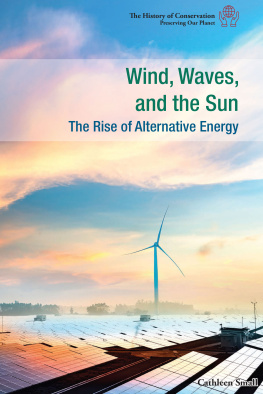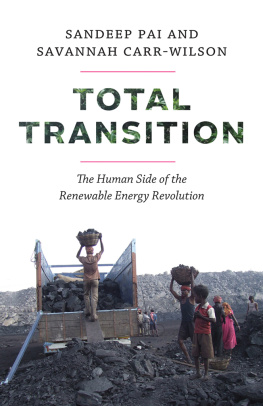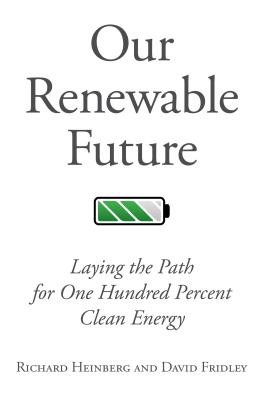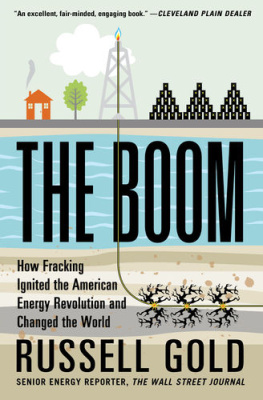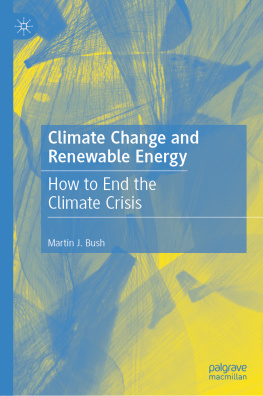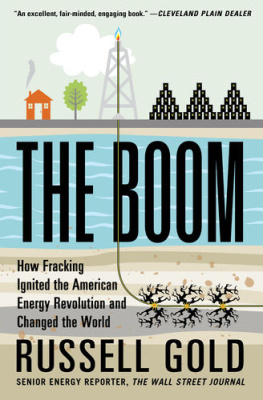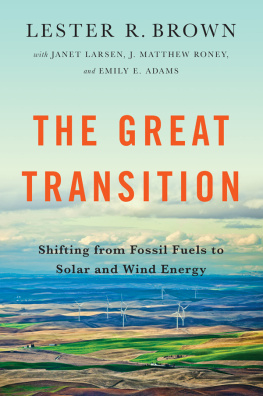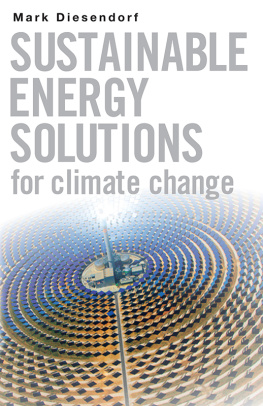Cover image: Thank you to the National Renewable Energy Laboratory (NREL), a Department of Energy laboratory in Colorado, for the use of this image of a hydrogen flame. Hydrogen, when burned with oxygen or used in a contained cell, is a zero-emission fuel that can power internal engines, vehicles, and electronic devices. (Warren Gretz / NREL)
Foreword
Never before has the world been as interdependent as it is today. We see this new reality in financial markets, in transportation and trade, and in patterns of health and migration. Most profound of all is the degree to which we are linked by threats to the Earths life support systems our atmospheric, oceanic, freshwater, and other key natural resources.
The reality of this kind of interdependence is entirely new in human history. Never before have the fates and responsibilities of the worlds people been as intertwined. Never before have we borne such heavy moral responsibilities to our children and grandchildren.
Unhappily, we are not living up to those responsibilities. In fact, we are failing badly as stewards of the natural systems that make human life and planetary productivity possible.
And our use of the atmosphere as a vast garbage dump is the most far-reaching failure of all. The global climate is changing even faster than many scientists anticipated only a few years ago.
The facts are indisputable. The primary global warming pollutant in our atmosphere has increased from 300 to more than 400 parts per million in a century. Over that same period, sea levels have increased by seven inches, and the acidity in the oceans has grown by more than 30 percent. The worlds great ice sheets are shrinking, led by rapid losses in Arctic sea ice at a rate of 3.54 percent per decade in the last 30 years. Glaciers are retreating the world over. The range and activities of species are changing on land, at sea, and in freshwater ecosystems. Weather patterns are changing, and extreme weather events droughts, wildfires, floods, and heat waves are increasing.
These realities have been rigorously documented by the worlds best scientists peer reviewed and widely popularized. Scientific consensus tells us that unless we significantly change course and reduce emissions, catastrophic climate change is likely in this century.
For too long, the political response to this mountain of scientific evidence has been utterly insufficient. We have squandered years, even decades in the fight against global climate change because too many elected leaders have refused to acknowledge how much our long-term economic and national security is linked to the health of the planets life support systems. Virtually all economic activity is dependent in some way on the environment and its underlying resource base everything from food and fuel to water and fiber. These are the foundations of the vast majority of all economic activity and most jobs. Over the long term, living off our ecological capital is a bankrupt economic strategy. Moreover, it is a recipe for global instability as climate changes inflict devastating and destabilizing consequences on the worlds poorest islands and coastal regions, on agriculture and food security, and on disease and global health.
To prevent this kind of a future, the science tells us that we need to stabilize carbon dioxide emissions immediately and begin rolling them back to achieve an 80 percent reduction from 1990 levels by 2050. Central to this agenda is the challenge of transforming the worlds energy systems to low and no-carbon fuels and electricity. The requirements are clear:
Using energy more efficiently is the low-hanging fruit of the worlds low carbon future. Massive opportunities exist for increased productivity in the transportation, building, and industrial sectors.
We need to facilitate rapid fuel-switching, so that we can move from the most carbon-intensive fuels, such as coal and oil, toward cleaner burning fuels, such as natural gas and renewables.
For the long term, we need to continue accelerating deployment of the clean energy technologies and jobs that are expanding rapidly in the solar, wind, and biomass industries.
And we have to set the right incentives for soil, wetland, and forest preservation, so that farmers can make money through sustainable practices and carbon sequestration.
With the worlds largest economy, and as the greatest long-term contributor to the global warming problem, the United States bears special responsibility in taking on the greatest economic, social, political, and moral challenge of the twenty-first century.
Bill Ritter has emerged as a highly unlikely guiding light for the kind of American political leadership that is required. As a former missionary, Ritter has long possessed a resolute moral compass and compassion for the poor. But he is a relatively new evangelist for climate action and energy innovation. This passion evolved from his decision to jump into politics. Many were perplexed when the tough-on-crime, pro-life Denver District Attorney announced his intention to run for governor in 2006. Few could envision what his platform might be. Even fewer gave him a chance of winning.
Throughout 2005 and 2006, Bill Ritter traveled the state of Colorado, hunting for votes. It was an expedition that changed him and the state completely. Ritter did what good politicians do he listened and learned. With a prosecutors attention to detail, he came to understand the changing energy landscape unfolding across Colorado and the nation. As a gifted political leader, he took what he learned, looked over the horizon, and defined an agenda for a new energy economy around which he could base his campaign and his administration as governor.
As governor, Bill Ritter implemented his plan for a new energy future by simultaneously harnessing responsible natural gas development and rapidly deploying energy efficiency and renewable energy. He reformed the states Oil and Gas Commission, dramatically expanded Colorados renewable energy standard to 30 percent by 2020, attracted numerous clean energy businesses and jobs, and launched a major effort to replace 900 megawatts of coal-fired electricity with cleaner alternatives.
This book, in part, chronicles the governors remarkable journey and ultimate embrace of global climate change and the clean energy challenge. It is a testament to the kind of change one individual can experience, and one individual can create. Moreover, it provides a roadmap for the future for how governors, states, and countries everywhere can become a part of the new energy future that Bill Ritter has helped usher in.
Today, there are nearly 400 solar energy companies in Colorado, providing more than 4,000 jobs. Colorado is among the top 10 states for per capita solar capacity. In the wind industry, Colorado hosts 23 manufacturing facilities and ranks fifth in the nation for wind energy jobs. All totaled, the state ranks in the top 10 nationally for installed wind and solar capacity.
The climate and energy challenge is the essential, existential priority for the future of humanity. All who want to join in forging solutions for the future will find in Bill Ritter and this book an example of the kind of political and moral courage that is required to change course and preserve the planets life support systems. And they will see that this is both a worthy challenge and a compelling opportunity for the work of this and future generations.
Timothy E. Wirth
2016 Bill Ritter, Jr.
All rights reserved. No part of this book may be reproduced, stored in a
retrieval system, or transmitted in any form or by any means, electronic,
mechanical, photocopying, recording, or otherwise, without written permission from the publisher.


